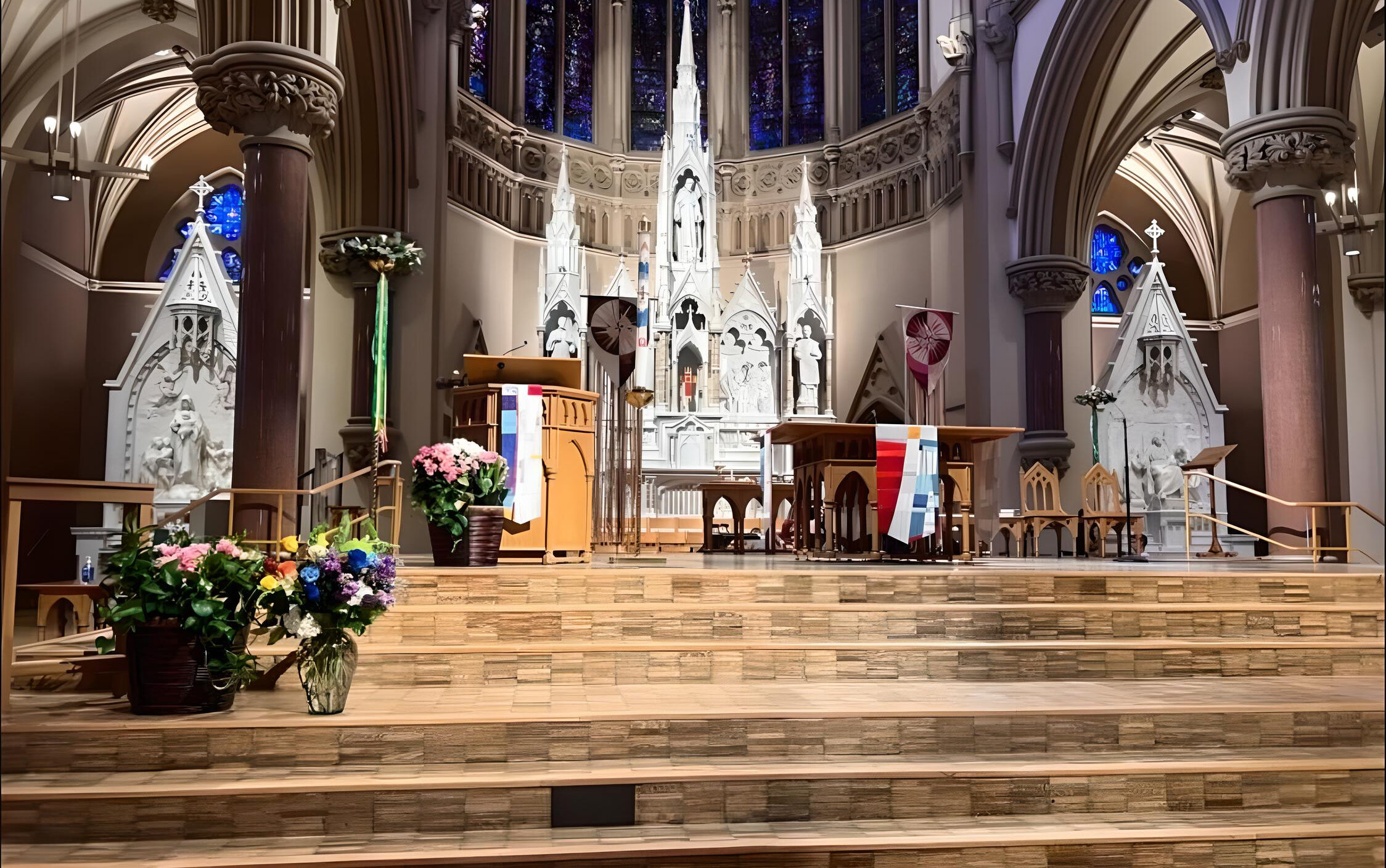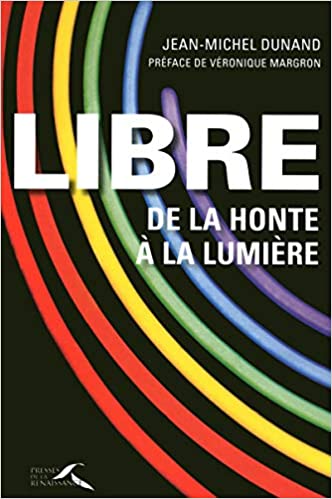Abby Hericks attends Mass each weekend at St. Francis Xavier College Church on the campus of Saint Louis University. When she was recently given the opportunity to welcome other LGBTQ students from across the country to Mass as part of the Ignatian Q conference, she jumped at the chance. But last Sunday, as she walked to the lectern to greet the roughly 120 conference participants, she was confused and then alarmed.
In the front rows of the church sat a crowd of about 20 people, separated by gender: men wearing jackets and ties seated on one side of the church, women in long dresses and veils on the other. Together, they were praying the rosary, in Latin and English, and many looked slightly older than the undergraduates at the conference. Both their attire and demeanor made them stand out. Many of the conference attendees sported clothing and accessories with rainbow and transgender flag colors.
When Ms. Hericks began the announcements, the group kept praying. Then they chanted the “Salve Regina,” their voices growing louder as she tried to get the crowd’s attention for her welcome. It was at that point that Ms. Hericks, a junior forensic science major from Sioux Falls, S.D., realized that the unfamiliar guests were not in church simply to pray or sing, but to protest.
In the wake of increased visibility for the wider LGBTQ community, church authorities and other believers have targeted these kinds of celebrations.
Ms. Hericks pressed on, welcoming the conference participants, explaining church rules about who is eligible to receive Communion and inviting the congregation to join in the opening hymn, “All Are Welcome, All Belong.”
But the protesters had gotten to her.
“I went back to my seat and cried through the first 30 minutes of Mass, because it was overwhelming to have those people there in a space where I’m supposed to feel safe, in a church I go to every weekend,” Ms. Hericks told Outreach.
Other Mass participants said the rest of the Mass was tense, because it was unclear what the group planned to do, perhaps even trying to block students from receiving Communion.
Protesting the presence of LGBTQ Catholics
Founded in 2014 at Fordham University, Ignatian Q offers LGBTQ students at Jesuit colleges and universities a chance to gather for worship, faith sharing and networking. Each year it is held at a different Jesuit college or university, and this year’s was the first meeting in the Midwest. The conference is a relatively rare opportunity for LGBTQ Catholic students to gather in church spaces and celebrate their identities.
In the wake of increased visibility for the wider LGBTQ community, church authorities and other believers have targeted these kinds of celebrations.
Last year, the U.S. Conference of Catholic Bishops took to social media to suggest Catholics use June to celebrate “Month of the Sacred Heart,” a message some Catholics interpreted as a protest against Pride Month. Around the same time, a group of Catholics in Pittsburgh, Pa., who hoped to gather for a Mass aimed at welcoming the LGBTQ community scrambled to find a new location after protests made hosting the Mass in the original location untenable. In Washington, D.C., a Jesuit parish hosted a Mass last year for LGBTQ Catholics, who were greeted by protesters gathered outside praying the rosary.
Though protests during Masses are relatively rare, several events in recent years have attracted attention.
Even though the Mass was entirely licit, a group of Catholics opposed to LGBTQ people decided that the Eucharist needed protection.
Three people were arrested following an interruption during the Easter Vigil earlier this month at New York’s Saint Patrick’s Cathedral, during which at least one protester yelled, “Free Palestine” as he left the church. Last year, a group of Catholic protesters interrupted a group of LGBTQ Catholics gathered for Mass in Lisbon, Portugal, which coincided with World Youth Day. And following the Supreme Court’s overturning of Roe v. Wade in 2022, a group of protesters reportedly interrupted Mass at a parish in the Archdiocese of Chicago, protesting Catholic teaching on abortion.
What made the actions in St. Louis relatively unique and particularly upsetting for those who were targeted was that even though the Mass was entirely licit, a group of Catholics opposed to LGBTQ people decided that the Eucharist needed protection. From what or whom, exactly, is unclear. One conference participant who interacted with the protesters said that they may have conflated other on-campus LGBTQ events, unrelated to the conference, with the Mass.
Conference organizers say that they still do not know who was responsible for the protest inside the church. A liturgical minister discovered that the group had left incendiary pamphlets in the pews of the church, and she scrambled to remove as many as possible before conference participants found them. Before Mass began, a Jesuit priest at the church asked a member of the group if they would leave the front row pews when they were finished praying the rosary, as they were reserved for conference participants. The group refused, saying that they planned to occupy the space as a form of protest, relegating the LGBTQ participants to the peripheries of the church, a reality the priest described as “gut-wrenching.”
Why it’s “gut-wrenching” for LGBTQ Catholics
That the optics alone felt “gut-wrenching” makes sense. I have been fortunate to have attended a handful of “Pride Masses” over the years, and what strikes me about these gatherings is the sense of joy that animates the liturgies. Often, LGBTQ Catholics try to blend into the crowd, afraid that drawing too much attention to themselves or their relationships could bring about unwanted conflict. Masses specifically aimed at welcoming LGBTQ Catholics allow for defenses to be dropped and the hypervigilance of one’s surroundings to lessen a bit. Connecting with God, praying in a community and receiving the Eucharist feels that much more vibrant when one is free from worry and anxiety.
Conference organizers say that they still do not know who was responsible for the protest inside the church. A liturgical minister discovered that the group had left incendiary pamphlets in the pews.
That atmosphere was supposed to prevail at the Ignatian Q Mass, but instead, the LGBTQ Catholics gathered in College Church were greeted with pamphlets calling their worship experience “blasphemous.” The protesters sought “to make communal reparation through public prayer, for a blasphemous Mass,” according to the pamphlets the group distributed. It went on to say that the group was comprised of students and community members and the pamphlet cited a controversial funeral service recently held for activist Cecilia Gentili in New York as an impetus for their action.
During that service, more than 1,000 people gathered to remember the transgender activist, but raucous chants from the crowd eventually drew condemnation from some church leaders who questioned whether the cathedral was an appropriate venue for the gathering.
The pamphlet suggested that those gathering in opposition to the “Queerly Beloved” Ignatian Q Mass “join us in the front rows to pray the rosary, gentlemen on the right, ladies on the left.” The prayers, in Latin and English, were offered “for the conversion of all suffering sexual temptations, heterosexual and homosexual.” The group wrote in the pamphlet, that they were not gathered “to demonstrate but to pray.”
But Lane Hartman, a transgender Catholic who leads the SLU Rainbow Alliance, said that the message was clear.
“It really hit me that these people are here because they hate me, or because they think that people like me can’t have full spiritual lives or relationships with God,” Mr. Hartman told Outreach.
“It’s hugely important for us to be visible in the church because maybe if I had this visibility in the church when I was growing up, maybe I wouldn’t have walked away.”
A senior studying math and chemistry, Mr. Hartman said that he had grown up Catholic but had walked away during high school when he was grappling with his gender identity. Because his church community had no visible LGBTQ members, he felt he had to choose between living authentically and his faith.
“I spent a lot of time praying God would fix me, and when he didn’t, I figured God hated me,” Mr. Hartman said.
But during college, he attended Mass with a friend and realized he had wanted to practice his faith again. He signed up to be a lector during the Ignatian Q Mass but when he realized that the encouraging community he was used to at College Church had been targeted by protesters, he broke down. A member of the campus ministry team offered to have someone take his spot for him, but Mr. Hartman refused.
“It’s hugely important for us to be visible in the church because maybe if I had this visibility in the church when I was growing up, maybe I wouldn’t have walked away,” he said.
Meeting bigotry with joy
Nick Fagnant, a doctoral student at Boston College’s Clough School of Theology and Ministry, who was at the Mass, said that what disturbed him about the protest was the message it sent to LGBTQ Catholics who had been away from the church but who sought a welcoming space to worship as part of the conference.
“What will this teach them about the Catholic Church?” he recalled thinking when he realized that a protest was taking place. “They finally show up, they have the courage to say yes to going to Mass for whatever reason, and this is how the church responds.” This was, after all, Catholics protesting against other Catholics during a Mass.
“Students met the protest and the bigotry with joy. The counterprotest was queer joy, community and celebration.”
The protesters remained kneeling in prayer during the entirety of the Mass, reciting the rosary aloud and at some points, shaking their rosary beads, apparently in protest. Mr. Fagnant said he was moved by the way conference staff, including some Jesuits and lay ministers, modeled a welcoming attitude toward the protesters while also standing up for the conference participants by ensuring that the Mass would continue. But mostly, he was heartened by the reaction of the undergraduates.
“Students met the protest and the bigotry with joy,” he said. “The counterprotest was queer joy, community and celebration.”




